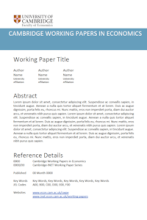The objective of this research project is to assess the welfare effects of targeted transfers, such as tax credits.
In particular, this project has three main objectives. First, to analyse the implications of tax credits on equilibrium wages. The literature has so far developed frameworks that allow accounting for the direct effect of targeted transfers, which dampens wage inequality, however, it is unclear whether in equilibrium the increased selection into working (induced by such tax credit schemes) exerts a downward pressure on wages, which overturns the direct effect. Second, this project will take into perspective the increased reliance of policy makers on targeted transfers over the past 2 decades and assess through the lens of a structural model the implications of such fiscal policies on the distribution of income, and in particular, to what extent such programs dampened or contributed to the increased wage inequality.
In the first subsection, we describe the empirical project, and in the second subsection, its theoretical counterpart. The outcomes of this research project will contrast existing literature on tax credits, which unilaterally disregards general equilibrium effects. In terms of policy guidance, this research project offers a strong test for the acclaimed success of tax credit programs, in particular in the US.
The Earned Income Tax Credit: Targeting the Poor but Crowding Out Wealth
The Earned Income Tax Credit: Targeting the Poor but Crowding Out Wealth, Maren Froemel and Charles Gottlieb, Cambridge Working Papers in Economics (2016)
In this paper, we quantify the effects of the Earned Income Tax Credit (EITC) from a macroeconomic perspective. We use an incomplete markets model to analyze jointly the labor supply and saving responses to changes in tax credit generosity and their aggregate and distributional implications. In line with existing literature, our results show that the EITC is an effective policy instrument to raise labor force participation and provide insurance to working poor households. However, we show that the EITC also disincentivizes private savings for a large part of the population, except for the poorest transfer recipients. Furthermore, since unskilled labor supply reacts more strongly than skilled workers' labor supply, wages for low skilled workers fall relative to high skilled workers. Whilst reducing post-tax earnings inequality, the EITC contributes to both a higher skill premium and wealth inequality. Finally, our welfare analysis suggests that EITC expansions are welfare improving for the majority of the population, both ex ante and when accounting for transitional dynamics.
This paper has been presented at various stages in the following external workshops, seminars, and conferences:
- 2014: EIEF 13th Workshop on Macroeconomic Dynamics: Theory and Applications (Rome)
- 2015: Society for Economic Dynamics Annual Meeting (Warsaw), Verein fuer Socialpolitik (Muenster)
- 2016: York University (Seminar), EEA-ESEM meetings Geneva.



